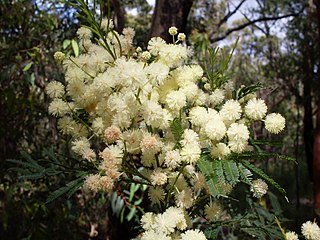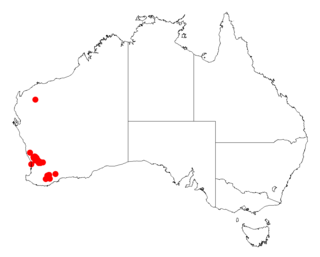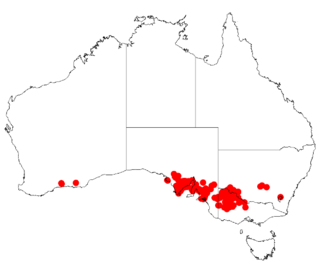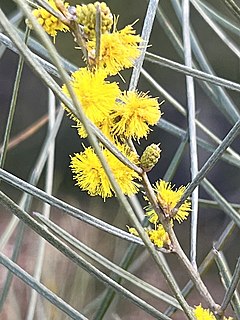
Acacia parramattensis, commonly known as Parramatta wattle, is a tree of the family Fabaceae native to the Blue Mountains and surrounding regions of New South Wales. It is a tall shrub or tree to about 15 m (49 ft) in height with phyllodes instead of true leaves. These are finely divided bipinnate. The yellow flowers appear over summer. It generally grows in woodland or dry sclerophyll forest on alluvial or shale-based soils, generally with some clay content.

Acacia decurrens, commonly known as black wattle or early green wattle, is a perennial tree or shrub native to eastern New South Wales, including Sydney, the Greater Blue Mountains Area, the Hunter Region, and south west to the Australian Capital Territory. It grows to a height of 2–15 m (7–50 ft) and it flowers from July to September.

Acacia triptera, commonly known as spurwing wattle, is an erect or spreading shrub which is endemic to Australia.

Acacia flexifolia, commonly known as bent-leaf wattle or small winter wattle, is a shrub species that is endemic to eastern Australia.

Acacia effusifolia is a shrub or tree belonging to the genus Acacia and the subgenus Juliflorae. It is native to an area in the Mid West and the Wheatbelt regions of Western Australia.

Acacia lirellata is a shrub belonging to the genus Acacia and the subgenus Juliflorae that is endemic to south western Australia.

Acacia tetraneura is a shrub belonging to the genus Acacia and the subgenus Juliflorae that is endemic to western Australia.

Acacia websteri is a shrub or tree belonging to the genus Acacia and the subgenus Juliflorae that is endemic to western Australia.

Acacia crassistipula is a shrub belonging to the genus Acacia and the subgenus Phyllodineae that is endemic to western Australia.

Acacia mollifolia, commonly known as the hairy silver wattle, velvet acacia and hoary silver wattle is a species of Acacia native to eastern Australia.

Acacia debilis, commonly known as the spindly wattle, is a species of Acacia native to eastern Australia.

Acacia asparagoides is a shrub belonging to the genus Acacia and the subgenus Phyllodineae. It is native to an area in south eastern New South Wales.

Acacia halliana is a shrub belonging to the genus Acacia and the subgenus Phyllodineae that is native to parts of south eastern Australia.

Acacia hamiltoniana, commonly known as Hamilton's wattle, is a shrub belonging to the genus Acacia and the subgenus Phyllodineae that is native to parts of eastern Australia.

Acacia torringtonensis is a shrub belonging to the genus Acacia and the subgenus Phyllodineae native to eastern Australia.

Acacia kybeanensis, commonly known as kybean wattle or kybeyan wattle, is a shrub of the genus Acacia and the subgenus Phyllodineae that is endemic to south eastern Australia.

Acacia linearifolia, commonly known as stringybark wattle or narrow-leaved wattle, is a shrub or tree of the genus Acacia and the subgenus Phyllodineae that is endemic to eastern Australia.

Acacia curranii, also known as curly-bark wattle, is a shrub belonging to the genus Acacia and the subgenus Juliflorae that is native to north eastern Australia. It is listed as vulnerable under the Environment Protection and Biodiversity Conservation Act 1999.

Acacia leptostachya, commonly known as Townsville wattle or slender wattle, is a shrub or small tree belonging to the genus Acacia and the subgenus Juliflorae that is native to north eastern Australia.

Acacia viscidula, also known as sticky wattle, is a shrub of the genus Acacia and the subgenus Plurinerves that is endemic to an area of eastern Australia.




















